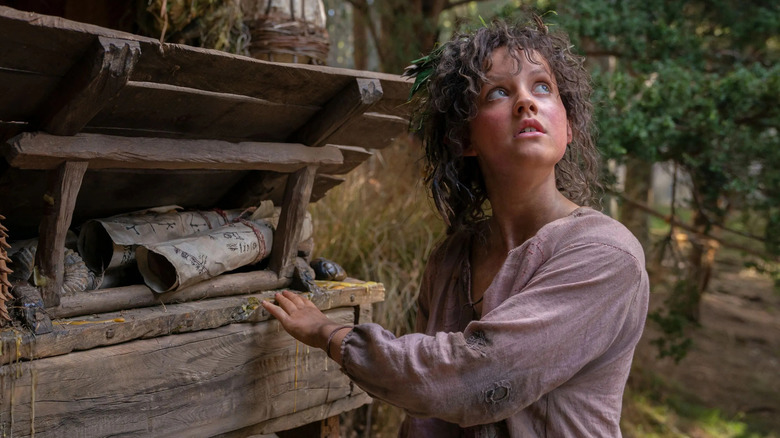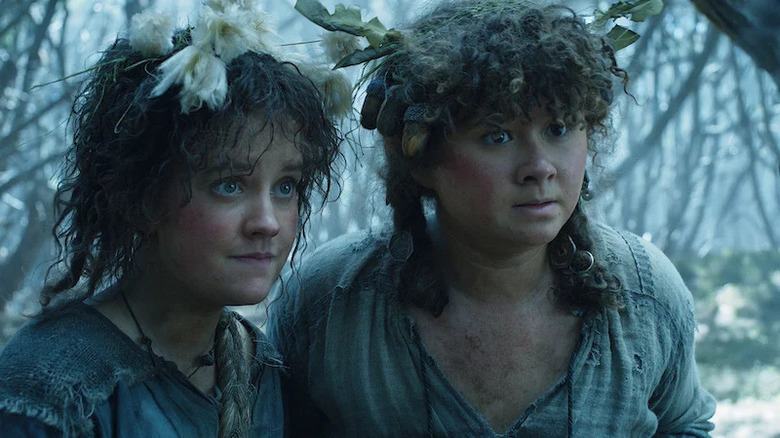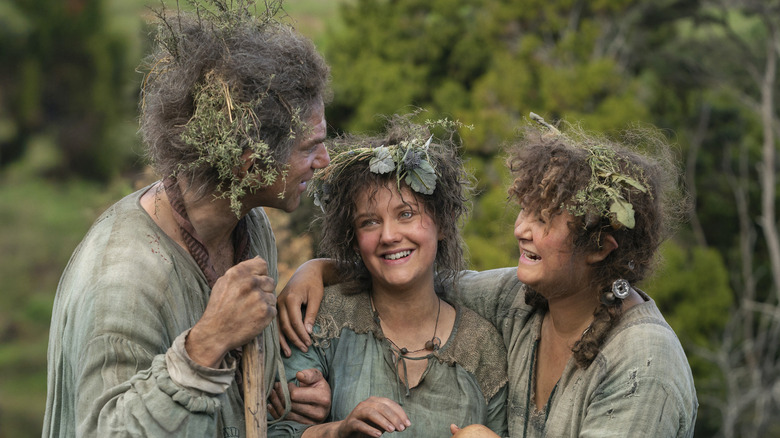The Rings Of Power Brings Back The Lord Of The Rings' Majestic Walking Songs
One of the biggest differences when you go from watching "The Lord of the Rings" movies to the first "The Hobbit" movie is its abundance of songs. There are sad dwarf songs, happy songs about washing dishes, and even a song by goblins. Though the next two movies all but erased this element, the Prime Video prequel series "The Rings of Power" finally brings back one of the most important elements of Tolkien's writing: music.
"The Rings of Power" has done a lot to capture the nuances and less flashy aspects of Tolkien's writing and mythos, like his fascination with trees and kind of bleak and pessimistic look at the course of history, but few things are as essential to the legendarium, and as misunderstood by the public, as Tolkien's love of songs. After all, Professor Tolkien's creation myth for Middle-earth literally begins with a song.
Sing us a song!
All throughout "The Lord of the Rings" and "The Hobbit," Tolkien included dozens of songs for all occasions. There are funny songs to lighten the mood in an otherwise dark and dramatic journey, like Sam's song about trolls, or everything Tom Bombadil did, there are solemn songs about war, loss, and sorrow, legends being told through poems and songs, and so much more. Tolkien, who studied mythology and history all his life, understood the importance of oral history, particularly in song form, and made sure Middle-earth had filled with songs that passed down legend and history.
Though the movies only barely touched upon this — there's only one funny hobbit drinking song, half of a walking song, and Pippin's heartbreaking song to Denethor, "The Hobbit" did give us the utterly excellent "The Misty Mountains" song. Now, "The Rings of Power" is bring back not only song, but especially the walking song back, and it's all thanks to the harfoots.
Not all who wander are lost
In the latest episode, we catch up on Nori and her harfoot family as they continue their migration trip after being left behind by their jerk kin. As they walk, Poppy Proudfellow treats the harfoots with her mother's own walking song, "This Wandering Day." It is a beautiful song, one that references one of Tolkien's most iconic phrases "all that is gold does not glitter, not all those who wander are lost." The song even fits with what is happening throughout the episode, as it tells of the dangers of leaving home and the uncertainty of the wandering path. "The Rings of Power" is all about entering some very dark days and the feeling of knowing something bad will happen even when no one else sees it, so Poppy's song is a mournful yet fitting song that still leaves on a very hopeful note.
Songs, but particularly walking songs, are dear and near to Tolkien's world, as they help both the reader get a sense of the incredible amount of time spent walking that the characters come up with songs, but also paint a picture of this world and these characters. As much as Tolkien's writing focused on the elf, it is the hobbits that truly feel the most unique and distinct, and having them be fond of singing songs to break up the monotony of the journey shows how much attention to detail Tolkien gave to writing the hobbits and making them feel like real creatures. The world around them may be getting darker and bleaker, and evil is threatening to destroy it all, but the hobbits are still going to sing, and still going to have hope that they will reclaim their sense of comfort.
"The Rings of Power" is streaming on Prime Video.


